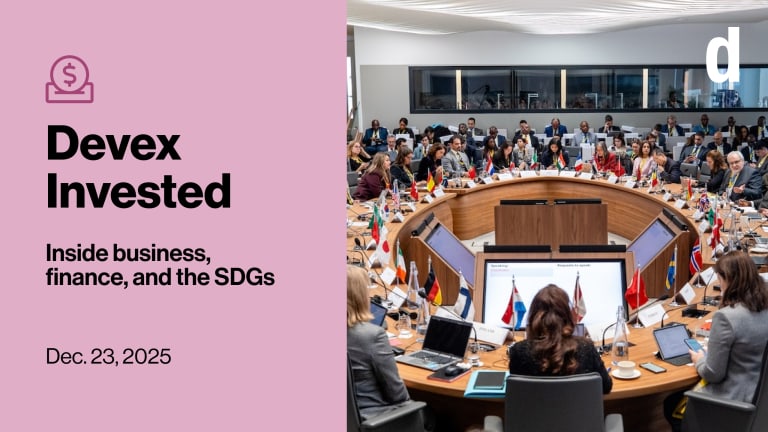
As we’ve all watched what’s happening in Ukraine following the Russian invasion, I’ve been wondering about the implications for development finance institutions.
So I did a bit of digging to find out who has projects in Ukraine and tried to get a sense of the impacts on DFIs’ portfolios and how they are responding to the crisis. Here’s what I learned:
This is a preview of Devex Invested
Sign up to this weekly newsletter inside business, finance, and the SDGs, in your inbox every Tuesday.
• The major DFIs operating in the region have been unified in their condemnation of the Russian attack. Many have quickly pledged funds to Ukraine, with the Europe-based institutions leading the way. Together, they have invested billions in projects and companies within the country, many of which are still active and are undoubtedly impacted by the war.
Among major DFIs, the European Bank for Reconstruction and Development appears to have the most investments in Ukraine. According to its database, the bank has about 511 projects in the country, though some of those have been completed. The European Investment Bank, IFC, the Netherlands’ FMO, and the U.S. International Development Finance Corporation each have at least a dozen investments in the country.
• Earlier this month, EBRD committed €2 billion ($2.2 billion) to support companies, individuals, and countries affected by the war. On Monday, it said that it would also close its offices in the capitals of Russia and Belarus. EBRD says it is monitoring its portfolio “very closely” and can offer support to Ukraine through payment deferrals, debt forbearance, and restructuring, according to a spokesperson. In addition, it is considering how it might support companies to relocate their operations — particularly those in the IT sector.
• The World Bank Group said it will provide $3 billion to support Ukraine in the coming months, though it didn’t specify exactly what this would go toward. IFC has disbursed funding for existing clients in Ukraine to provide fuel and ensure food security. IFC is also looking to expand access to trade finance for Ukrainian companies. “As the situation remains fluid, decisions on the form of that support will be taken at the appropriate time,” a spokesperson says.
• Several DFIs said they stand ready to support Ukraine to rebuild when the conflict ends. Werner Hoyer, the president at EIB — which has also pledged about €2 billion and disbursed hundreds of millions already — recently said that “we rebuilt before, and we will rebuild again, in a free and independent Ukraine.”
Check out the work my Devex colleagues have been doing on the war’s varied implications, from the food crisis and health challenges to how NGOs are staffing up.
A whole new world
The head of the largest asset manager across the globe is warning that the world is about to change. In a letter to shareholders last week, BlackRock CEO Larry Fink said that “the Russian invasion of Ukraine has put an end to the globalization we have experienced over the last three decades.”
The upside in his letter is a view that Russia’s invasion and the surrounding events will “accelerate the shift toward greener sources of energy in many parts of the world” over the long term. But in the short run, he said, we are looking at serious roadblocks to hitting net-zero emissions.
Your next job?
Finance & Investment Advisor, SAMI Project
The Palladium Group
South Africa
Fink is not alone in warning about the fallout for globalization. Adam Posen, president at the Peterson Institute for International Economics, said in a recent interview that we are seeing the "corrosion of globalization." This will mean higher inflation, fewer choices of goods, and a harder time building wealth, he said.
"In a world that’s more divided and more politically uncertain, you end up trapping people’s savings. ... That’s going to drive down the return savers get, and it’s going to reduce diversification. So you’re more at risk,” Posen said.
To-do list
Scott Nathan, the new CEO at DFC, got an interesting letter last week from the agency’s independent inspector general. The IG said the correspondence, which outlines issues for Nathan to address, was sent as part of his responsibility to provide policy guidance that will increase the agency’s “economy and efficiency.”
What’s on the list? Improving monitoring and evaluation of impact, managing organizational transition, meeting the heightened expectations of Congress and stakeholders, and implementing the BUILD Act, the legislation that created DFC.
The letter also mentions the results of the 2020 Federal Employee Viewpoint Survey, which showed that DFC’s ranking among small agencies plummeted — seemingly driven by a lack of respect for senior leaders during the Trump administration. We’ll be watching for the results of the 2021 survey.
DFC: IG sends new CEO a list of issues to address (Pro)
+ A Devex Pro subscription offers deeper analysis of the development sector, exclusive digital events, and access to the world’s largest global development job board. Try it out today by signing up to our 15-day free trial.
Adaptation calculation
The costs of climate adaptation finance are likely to be the highest — relative to GDP — in low-income countries, according to new research from the International Monetary Fund, my colleague Shabtai Gold writes.
Annual adaptation needs will exceed 1% of GDP in about 50 lower-income countries for the next 10 years, IMF says. For some small island states, the costs may skyrocket up to 20% of GDP.
IMF: Poor nations lack funds to finance climate adaptation projects
What we’re reading
Dutch bank ING announces it will end financing for new oil and gas projects. [Reuters]
Here’s what more U.K. aid cuts could mean for climate change, health, and conflict. [Devex Pro]
USAID finds that procurement practices inhibit diversity. [Devex Pro]
Standard Chartered has launched an initiative targeting women-owned businesses. [Peacefmonline.com]
Shabtai Gold contributed to this edition of Invested.









